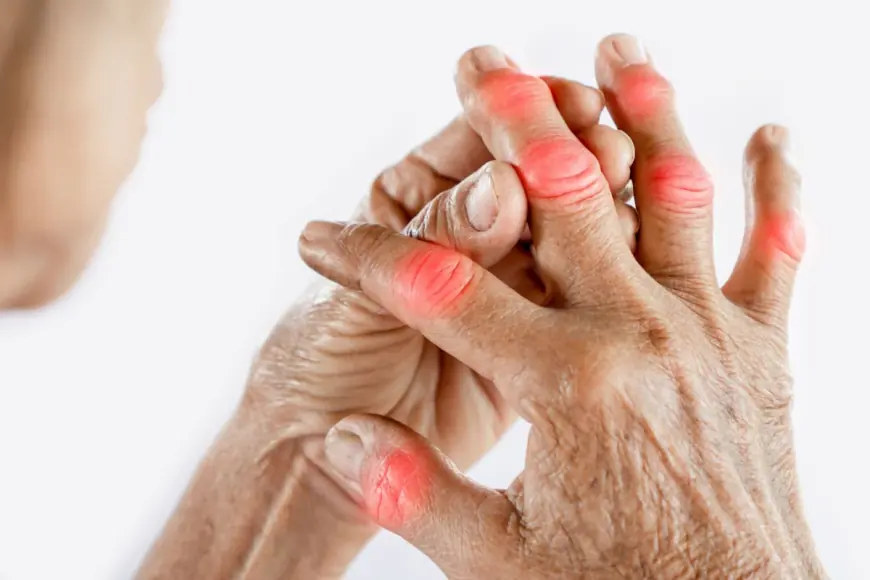RHEUMATOID ARTHRITIS: CAUSES, SYMPTOMS, AND TREATMENTS

Rheumatoid arthritis (RA) is a chronic illness that makes joints painful, swollen, and stiff. The hands, feet, and wrists are typically affected. This condition arises when the immune system malfunctions and begins to target the synovium, which is the lining of the joints. Typically, it impacts the hands, knees, or ankles, often affecting the same joint on both sides of the body, such as both hands or both knees. However, rheumatoid arthritis can also lead to complications in other areas, including the eyes, heart, circulatory system, and lungs. Unfortunately, a definitive cure for this condition does not exist. Although traditional medicine provides various treatment options, including pharmaceuticals and surgical interventions, numerous individuals affected by this condition explore alternative methods to alleviate their symptoms and enhance their overall well-being. In this context, Ayurveda becomes significant. Ayurveda for rheumatoid arthritis in Kerala provides a comprehensive method for addressing the disease, focusing on harmonizing the body's doshas and reducing symptoms. According to Ayurveda, this illness is classified as a form of vatarakta (Kaphjam), in which the vitiated Vata, rakta, and kapha induce inflammation and joint and structural deterioration. This problem can be effectively managed with Ayurvedic treatment, which also helps to stop the condition from getting worse.
CAUSES OF RHEUMATOID ARTHRITIS
Researchers are still uncertain about the underlying causes that prompt the immune system to target the body's joints and other tissues. Evidence suggests that a combination of various factors may contribute to the disease, including:
1. Genetic Factors
Certain genes that impact immune system behavior may be associated with rheumatoid arthritis. However, it is noteworthy that some individuals with these genetic markers never experience the disease, indicating that genetics is not the sole contributor to RA's development. Additionally, it is possible that several genes collectively influence both the risk of contracting the disease and its intensity.
2. Environment
Ongoing research is focused on understanding how environmental elements, including cigarette smoke, can activate rheumatoid arthritis in individuals with certain genetic predispositions that heighten their risk. Furthermore, various factors such as inhalants, bacteria, viruses, periodontal disease, and respiratory conditions may contribute to the onset of rheumatoid arthritis.
3. Hormones
Researchers also propose that sex hormones might influence the development of this condition in conjunction with genetic and environmental factors. Evidence indicates that women are at a higher risk of developing rheumatoid arthritis compared to men, and the condition may experience improvement during pregnancy, followed by exacerbation post-pregnancy.
SYMPTOMS OF RHEUMATOID ARTHRITIS
Years before any symptoms of rheumatoid arthritis become apparent, your immune system might start to target your body's joints and tissues. This immune dysfunction generally localizes in the joints. The effects of RA can differ significantly from person to person; some individuals may only experience the disease for a short duration, while others may have intermittent symptoms. In its more severe form, RA can be chronic and may endure for a lifetime. Symptoms associated with rheumatoid arthritis may encompass the following:
- Experiencing pain or stiffness in the joints during movement, which tends to be more pronounced in the morning or following periods of inactivity. Typically, rheumatoid arthritis impacts both joints; for instance, if one hand or knee is affected, the corresponding joint on the opposite side is likely to be as well.
- Tenderness, redness, and warmth in the joints.
- Swelling in the joints can hinder daily activities, such as combing hair, fastening clothing, or bending the knees.
- Additionally, individuals may experience fatigue, fever, and a decreased appetite.
- The presence of hard lumps, known as rheumatoid nodules, may develop beneath the skin near the affected joints.
AYURVEDIC TREATMENT FOR RHEUMATOID ARTHRITIS
Ayurveda aims to restore internal balance in patients with rheumatoid arthritis by implementing specific lifestyle modifications and utilizing herbal remedies. The primary goal of ayurvedic treatment is to alleviate pain in the affected joints, as well as to reduce swelling and inflammation. This holistic approach employs natural remedies to address and manage the underlying causes of rheumatoid arthritis.
1. Detoxification Procedure
Panchakarma, a fundamental detoxification procedure rooted in ancient Ayurvedic practices, serves to cleanse and purify the body. This technique alleviates inflammation and discomfort while enhancing joint mobility for individuals suffering from rheumatoid arthritis. The detoxification process includes specific therapies such as Vamana (therapeutically induced vomiting), Virechana (laxative therapy), Vasti (colon therapy), Nasya (nasal oil therapy), and Raktamokshana (blood purification therapy). It is crucial to emphasize that Panchakarma should only be conducted under the supervision of a qualified practitioner. Prior to initiating any additional treatments, it is vital to consult with an Ayurvedic physician to confirm that the approach is appropriate for one’s individual health needs.
2. Diet And Nutrition
To alleviate additional pressure on your joints, it is vital to sustain a healthy body weight through a wholesome diet, which will also contribute to the balance of your dosha. Ayurveda suggests that warm foods are beneficial for the kapha dosha, while a diet that pacifies the vata and pitta doshas is equally important. Including stewed and cooked foods such as black gram, sweet potatoes, squash, cooked apples, and soaked raisins in your meals is recommended. It is prudent to avoid excessively spicy foods, along with certain hard-to-digest vegetables and fruits. Additionally, it is advisable to refrain from consuming sour and fermented foods like green grapes, pineapple, sour cream, and hard cheeses.
3. Herbal Remedies
Many herbs used in ayurveda are known for their anti-inflammatory effects, and when taken in certain forms, they can assist in reducing the symptoms of rheumatoid arthritis.
4. Oil Massage
Ayurvedic practitioners suggest that massaging the affected joints with herbal oils can alleviate pain and enhance circulation. This method of oil massage is a widely recognized treatment for rheumatoid arthritis.
5. Exercise And Physical Activity
Ayurveda recommends engaging in low-impact activities that minimize stress on the joints, as they are advantageous for individuals with rheumatoid arthritis.
CONCLUSION
Ayurvedic therapies for rheumatoid arthritis demonstrate significant efficacy. The foundational principle of these treatments revolves around achieving a balance of doshas. The primary goal of Ayurvedic treatment in Thrissur to manage rheumatoid arthritis is to alleviate the pain and stress associated with this inflammatory condition, emphasizing lifestyle modifications such as dietary adjustments, physical activity, and the use of herbal remedies.
What's Your Reaction?
 Like
0
Like
0
 Dislike
0
Dislike
0
 Love
0
Love
0
 Funny
0
Funny
0
 Angry
0
Angry
0
 Sad
0
Sad
0
 Wow
0
Wow
0























































